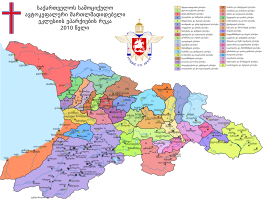Eparchy
Eparchy (Greek: ἐπαρχία eparchía "overlordship") is an ecclesiastical unit in Eastern Christianity that is equivalent to a diocese in Western Christianity. An eparchy is governed by an eparch, who is a bishop. Depending on the administrative structure of a specific Eastern Church, an eparchy can belong to an ecclesiastical province (usually a metropolis), but it can also be exempt. Each eparchy is divided into parishes, in the same manner as a diocese in Western Churches. Historical development of eparchies in various Eastern Churches was marked by local distinctions that can be observed in modern ecclesiastical practices of the Eastern Orthodox Church, Oriental Orthodox Churches and Eastern Catholic Churches.[1]
Terminology
The
In the
Since it was commonly used as the main Greek designation for an administrative province of the Roman Empire, the term eparchy consequently gained an additional use among Greek-speaking
Eastern Orthodox Church


Throughout the late antiquity and the early medieval period, within
During the later medieval period, terminology started to shift, particularly within the Patriarchate of Constantinople. The process of title-inflation that was affecting Byzantine bureaucracy and aristocracy also gained momentum in ecclesiastical circles. In order to promote centralization, patriarchal authorities started to multiply the numbers of metropolitans by elevating local bishops to honorary metropolitan ranks without giving them any real metropolitan powers, and making them directly appointed and thus more dependent on Constantinople. As a consequence, the use of the word eparchy was expanded to include not only proper metropolitan provinces, but also the newly created honorary metropolitan sees that were no real provinces, and thus no different then simple bishoprics except in honorary titles and ranks. In spite of that, such honorary metropolitan sees also came to be called eparchies. This process was systematically promoted, thus resulting in a major terminological shift.[10]


Since the fragmentation of the original metropolitan provinces into several titular metropolises that were also referred to as eparchies, the Patriarchate of Constantinople became more centralized, and such structure has remained up to the present day.
Eparchies of the main Eastern Orthodox churches:
- Eparchies of the Ecumenical Patriarchate of Constantinople
- Eparchies of the Greek Orthodox Patriarchate of Alexandria
- Eparchies of the Greek Orthodox Patriarchate of Antiochia
- Eparchies of the Greek Orthodox Patriarchate of Jerusalem
- Eparchies of the Russian Orthodox Church
- Eparchies of the Orthodox Church of Ukraine
- Eparchies of the Serbian Orthodox Church
- Eparchies of the Romanian Orthodox Church
- Eparchies of the Bulgarian Orthodox Church
- Eparchies of the Georgian Orthodox Church
- Eparchies of the Cypriot Orthodox Church
- Eparchies of the Orthodox Church of Greece
- Eparchies of the Polish Orthodox Church
- Eparchies of the Albanian Orthodox Church
- Eparchies of the Czech and Slovak Orthodox Church
Eastern Catholic Churches
In the
Individual eparchies of some Eastern Catholic Churches may be suffragan to Latin Church metropolitans. For example, the Greek Catholic Eparchy of Križevci is suffragan to the Roman Catholic Archdiocese of Zagreb.[12] Also, some minor Eastern Catholic churches have Latin prelates. For example, the Macedonian Greek Catholic Church is organized as a single Eparchy of Strumica-Skopje, whose present ordinary is the Roman Catholic bishop of Skopje.[13]
See also
- Eparchy (Roman province)
- Eparchy (Byzantine province)
- Eparchy (modern Greece)
- Eparchy (modern Cyprus)
References
- ^ a b Nedungatt 2002, p. 228.
- ^ Stevenson 2010, p. 588.
- ^ Vitale 2012.
- ^ Vitale 2016, p. 82-111.
- ^ Mason 1974, p. 81, 84-86, 138-139.
- ^ First Ecumenical Council (325): Canon IV
- ^ Meyendorff 1989, p. 55.
- ^ Cross & Livingstone 2005, p. 552.
- ^ Ohme 2012, p. 37.
- ^ Meyendorff 1989.
- ^ Eparchies of the Ecumenical Patriarchate of Constantinople (Επαρχίες Οικουμενικού Θρόνου)
- ^ David M. Cheney. "Diocese of Križevci". Catholic Hierarchy. Retrieved 2018-04-16.
- ^ David M. Cheney. "Eparchy of Beata Maria Vergine Assunta in Strumica-Skopje". Catholic Hierarchy. Retrieved 2019-04-24.
Sources
- Cross, Frank L.; Livingstone, Elizabeth A., eds. (2005) [1957]. The Oxford Dictionary of the Christian Church (3rd rev. ed.). Oxford: Oxford University Press. ISBN 978-0-19-280290-3.
- Kiminas, Demetrius (2009). The Ecumenical Patriarchate: A History of Its Metropolitanates with Annotated Hierarch Catalogs. Wildside Press LLC. ISBN 9781434458766.
- Mason, Hugh J. (1974). Greek Terms for Roman Institutions: A Lexicon and Analysis. Toronto: Hakkert. ISBN 9780888660138.
- ISBN 9780881410563.
- ISBN 9788872103364.
- Ohme, Heinz (2012). "Sources of the Greek Canon Law to the Quinisext Council (691/2): Councils and Church Fathers". The History of Byzantine and Eastern Canon Law to 1500. Washington: CUA Press. pp. 24–114. ISBN 9780813216799.
- Ostrogorsky, George (1956). History of the Byzantine State. Oxford: Basil Blackwell.
- Stevenson, Angus, ed. (2010) [1998]. Oxford Dictionary of English (3rd ed.). Oxford: Oxford University Press. ISBN 978-0-19-957112-3.
- Vitale, Marco (2012). Eparchie und Koinon in Kleinasien von der ausgehenden Republik bis ins 3. Jh. n. Chr. Bonn: Dr. Rudolf Habelt Verlag. ISBN 9783774937390.
- Vitale, Marco (2016). "Priest—Eparchy-arch—Speaker of the Ethnos: The Areas of Responsibility of the Highest Officials of the Eastern Provincial Imperial Cult". Mnemosyne. 69 (1): 82–111. .
External links
 The dictionary definition of eparchy at Wiktionary
The dictionary definition of eparchy at Wiktionary- Catholic Encyclopedia (1909): Adrian Fortescue: Eparchy
- Map with all Dioceses of the Eastern Churches
